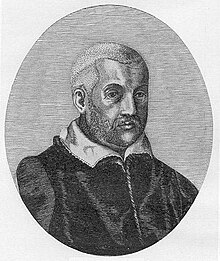Muretus

Muretus is the Latinized name of Marc Antoine Muret (12 April 1526 – 4 June 1585), a French humanist who was among the revivers of a Ciceronian Latin style and is among the usual candidates for the best Latin prose stylist of the Renaissance.
Biography
[edit]He was born at Muret near Limoges. At the age of eighteen he attracted the notice of the elder Scaliger, and was invited to lecture in the archiepiscopal college at Auch. He afterwards taught Latin at Villeneuve, and then at the College of Guienne, Bordeaux,[1] where his Latin tragedy Julius Caesar was presented. Some time before 1552 he delivered a course of lectures in the Collège du Cardinal Lemoine at Paris, which drew a large audience, King Henry II and his queen being among his hearers.[1] In Paris he formed part of the larger circle of humanists and poets that included Jean Dorat and Pierre de Ronsard.[2] He wrote almost exclusively in Latin: epigrams, odes, satires and letters, which were widely circulated before they were printed. His orations remained models for students through the eighteenth century.[3]
His success made him many enemies, and he was thrown into prison on a charge of homosexuality, but released by the intervention of powerful friends. The same accusation was brought against him at Toulouse, and he only saved his life by timely flight. The records of the town show that he was burned in effigy as a Huguenot and as sodomite (1554).[1]
After a wandering and insecure life of some years in Italy, he received and accepted the invitation of the Cardinal Ippolito II d'Este to settle in Rome in 1559. In 1561 Muretus revisited France as a member of the cardinal's suite at the conference between Roman Catholics and Protestants held at Poissy.[1]
He returned to Rome in 1563. His lectures gained him a European reputation, and in 1578 he received a tempting offer from the king of Poland to become teacher of jurisprudence in his new college at Kraków. Muretus, however, who about 1576 had taken holy orders, was induced by the liberality of Gregory XIII to remain in Rome, where he died.[1]
Muretus edited a number of classical authors with learned and scholarly notes. His other works include Juvenilia et poemata varia, orationes and epistolae.[1]
Works
[edit]- Two volumes of Scripta selecta, edited by J. Frey, 1871.
- Variae lectiones, edited by Friedrich August Wolf and J. H. Fasi, 1791–1828.
- The Iuvenilia of Marc-Antoine Muret, edited and translated by Kirk. M. Summers, Columbus, OH: 2006
Complete editions
[edit]- Editio princeps, Verona (1727-1730). There were further editions of Muretus edited by David Ruhnken (1789) and by C. H. Frotscher (1834-1841).
On-line
[edit]- Julius Caesar Muretus' Senecan tragedy, printed in 1591 (Latin text)
Notes
[edit]- ^ a b c d e f Chisholm 1911.
- ^ He published a commentary, in French, on Ronsard's Amours, 1553.
- ^ Orationes, et epistolae...ad usum scolarum selectae.... Venetiis: Apud Josephum Orlandelli, 1791, for example. The collection had been republished repeatedly since 1739 [1] Archived 2006-03-15 at the Wayback Machine
References
[edit]- This article incorporates text from a publication now in the public domain: Chisholm, Hugh, ed. (1911). "Muretus". Encyclopædia Britannica. Vol. 19 (11th ed.). Cambridge University Press. p. 34. Endnotes:
- Dejob, C (1881), Monograph, Paris
{{citation}}: CS1 maint: location missing publisher (link) - Sandys, J.E (1908), History of Classical Scholarship, vol. ii (2nd ed.), pp. 148–152
- Dejob, C (1881), Monograph, Paris
Further reading
[edit]- Herbermann, Charles, ed. (1911). . Catholic Encyclopedia. Vol. 10. New York: Robert Appleton Company.
